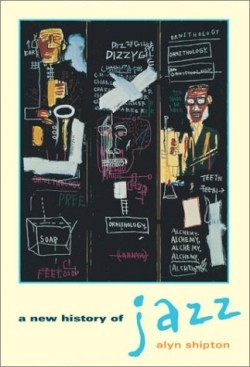A New History of Jazz
“Of all the musical forms to emerge during the twentieth
century,” writes the author, “jazz was by far the most significant.” The author lends support to this statement by writing extensively and intelligently about jazz from its origins in the nineteenth century to its fragmentation at the end of the twentieth. Chapters are devoted to major movements—hard bop and free jazz—and major players—Miles Davis and John Coltrane. The book also explores older mysteries, including the rapid emergence of jazz in the early 1900s.
Shipton includes good coverage of a number of areas, like jazz singing, that have received less attention in other histories. Early blues singers, primarily women like Ethel Waters, Elizabeth Welch, and Alberta Hunter, began to improvise by altering pitch and tempo, drawing out syllables, and adding scat phrases. Cab Calloway utilized “Jewish cantors, country blues singers, and fast-talking, streetwise low-life characters” to create an energized jazz singing, impossible to imitate. While big name singers like Louis Armstrong and Ella Fitzgerald receive ample coverage, many lesser luminaries also receive credit for their innovations.
The last chapter attempts to grasp the rapid changes in jazz during the last thirty years. For nearly seventy years, jazz history seemed to be moving forward with fairly smooth transitions from one style to the next. In the 1970s, however, jazz styles began to fragment, with many young musicians choosing older styles such as Dixieland or swing instead of fusion or free jazz. Because of this fragmentation, today’s fan can attend concerts of current musicians playing every style of jazz that ever existed. While Shipton believes that knowledge of the past is an essential of good jazz, he also adds that mimicking the past, without adding new ideas, leads to sterility.
Shipton presents jazz programs for BBC radio, is a critic for the London Times, and has written a biography of Dizzy Gillespie. His analysis is dense, but he avoids academic jargon. A New History of Jazz works as a detailed overview, providing an up-to-date history of the music, and as a reference book, allowing the reader to study in-depth accounts of bebop, swing, fusion, and world jazz. Either way, it succeeds as a penetrating history of the birth, development, and triumph of this most American of art forms.
Disclosure: This article is not an endorsement, but a review. The publisher of this book provided free copies of the book to have their book reviewed by a professional reviewer. No fee was paid by the publisher for this review. Foreword Reviews only recommends books that we love. Foreword Magazine, Inc. is disclosing this in accordance with the Federal Trade Commission’s 16 CFR, Part 255.

